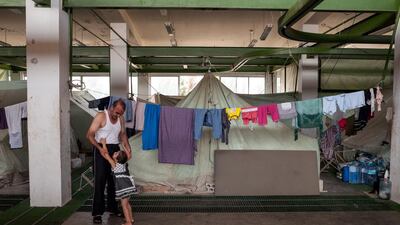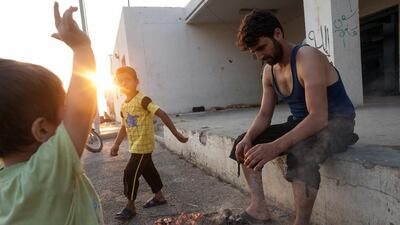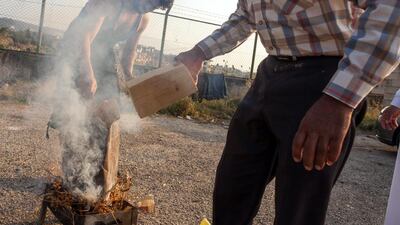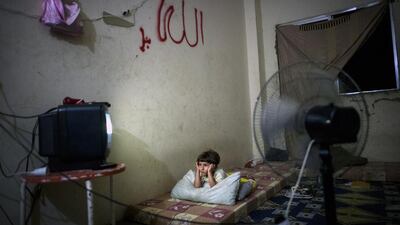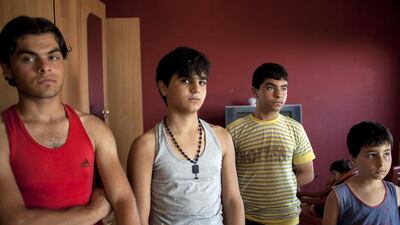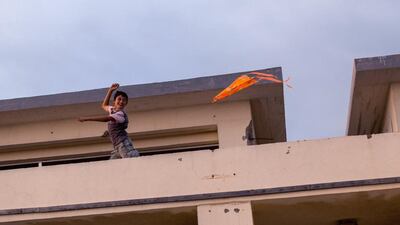The number of refugees who have fled war-torn Syria and registered in Lebanon reached the “devastating milestone” of one million last week, the UN said.
Photographer Liam Maloney spoke to some of those who left their homes and sought refuge in the neighbouring country, documenting their plight and listening to their stories.
Abu Abdel Rahman stirred slightly when I entered his room, and the sheet covering his amputated legs shifted enough for me to see what a 100mm tank round can do to the human body. His 13-year old son Mohammad slept soundly on a mat on the floor by his side, and he was flanked by a prayer mat and a wheelchair. A pair of sandals that couldn’t have been his were by his bedside.
The 40-year old father of seven has been at this hospital in Tripoli for two months, slowly regaining his strength and waiting to be fitted with prosthetics, which are currently in very short supply — and which he may not even be able to afford. His son has been caring for him while his wife stays home with the other children. Money is tight. It’s not clear how he’s going to support his family.
“We were farmers ... labourers. We didn’t know how to use weapons, but we had to defend ourselves. The regime slaughtered whole villages with knives. Workers returning home were lined up and executed, their pockets emptied. This is why we took up arms against the regime. We sold our land, our cars, our wives’ jewellery to buy Kalashnikovs.”
He continued, sitting up, his voice breaking: “The regime entered our village with tanks and heavy weapons. Families were hiding underground. We were bombed by MIGs. There were many direct hits on houses ... many were crushed to death. The entire village was looted and destroyed. Homes were levelled to create platforms for tanks. Every day we buried at least 20 people. One day, we buried 61. Women, children, the elderly ... There were no shrouds left for the victims. We used curtains, tarpaulins ... anything. People didn’t have any food ... “ his voice trailed off and he sobbed heavily. His son took his hand, pulled a cellphone from his pocket and silently held the screen up, showing me the lifeless, blood-encrusted faces of two babies.
Wearing his beard long, with his moustache cropped close in the Salafist style, it would be easy to assume he had been a fighter with one of the extremist groups. I ask Mohammad what he wants to do when he grows up, and he responds without hesitation, “I want to be the leader of Al-Nusra.” His father smiles thinly, “A doctor. He wants to be a doctor. He was first in his class in school.”
Mohammad hasn’t attended school in three years. Whatever their beliefs were before the war, Abu Abdel rahman and his son were radicalised when their village was destroyed, their friends and families killed and their lives uprooted. It’s difficult to see what other choice Abu Abdel rahman had. “God willing, we’re going back home, even without out limbs. It’s our right to reclaim our land and our homes.” With no end in sight, fractured militias fighting each other and only a trickle of small arms to battle the regime’s tanks, jets and artillery, that day seems awfully far away.
In Beddawi, a Palestinian refugee camp on the outskirts of Tripoli, a woman pulls a neatly-folded 50,000 LL bill from her purse. The equivalent of $30, it could buy enough food for a week. This bill is special though; her son gave it to her just days before he was killed in Homs fighting against the regime. “Smell it”, she says, “it still smells like his hands.”
When she got news of his death, she went to the local morgue, which was full. The dead had been piled up inside refrigerated containers normally used to keep vegetables fresh. She looked at 400 bodies, but her son was not among them.
She counts off the number of people killed or missing in her family, soon running out of fingers. “I came to Lebanon so my daughters would not be raped”, she says matter-of-factly, “but I really regret it.” None of her children have been able to enrol in school, and providing for them is a constant struggle.
In Akkar, on the edges of a small village, a disused slaughterhouse is now home to 16 Syrian families. Stakes and ropes have been fastened to the gutters where blood used to pool. The sight of tents inside the cavernous space seems absurd, but it affords families a little privacy. The municipality offered the space to them, but the settlement has been built up almost entirely by the refugees themselves. They live communally, sharing food and money and caring for each other’s children. Two of the refugees are teachers, and they were able to register 20 school-age children at Al Fares Al Sagheer, the local madrasa.
“We need everything,” says Safwan, the de facto leader of the group, “we can’t afford medications for our kids and for the elderly. We don’t have a fridge or a water tank. We have electricity sometimes, but it isn’t reliable. Everyone here is broke.”
Indeed, it seems that nobody here has been able to find decent employment, and the food vouchers coming in from UNHCR amount to $27 per person per month. It costs them $7 in transportation just to get to the branch office to receive the vouchers, which they then can use to buy specific items from co-operating supermarkets. After food and basic essentials are covered, there’s nothing left for additional needs, let alone medications. A recent text message from UNHCR to one of the refugees living in the slaughterhouse read: “Please be aware that in August, we will not give out soap, shampoo or dish soap”. It’s clear that the aid agencies are in over their heads — the enormity of the refugee crisis and the continuing influx is outpacing operating budgets.
When the families first settled inside the slaughterhouse, they were visited by a dignitary from an aid agency. They assembled outside and made him a big sign welcoming him and pleading for assistance. Afterwards, they waited hopefully for him to deliver on his promises. No help ever came. “Now we’re making a sign for Ban Ki Moon” Safwan joked. Gallows humour rules the day here.
Outside the slaughterhouse, children ran around laughing and playing, whipping past each other on battered bicycles that sounded as if they could rattle apart at any moment. The dying rays of the sun made a boy’s kite flash a bright orange as he ran across the rooftop with it trailing behind him. The men sat quietly on a carpet at the entrance, watching listlessly.
“We were middle-class Syrians. We had shops, had cars parked in front of our houses, owned land ... do you think we want our children to live like this?”
In Baawerta, near Damour, a Christian village outside of Beirut known mostly for being the site of a terrible massacre during the Lebanese civil war, the population has almost doubled in the past year. Syrian refugees have settled in unfinished holiday homes that have been rapidly renovated by opportunistic property owners. Many of the apartments lack running water, but that hasn’t prevented the landlords from raising rents two to four times above what they should be. To save money, families share the flats. It’s not uncommon to find over twenty people living in a two-bedroom apartment. Outside one of the dilapidated buildings, children run through the tall grass with toy guns. A mother and her two children from Houla hurriedly load luggage into a taxi and leave, while others stand outside and wave slowly. They’ve got plane tickets to Cairo and are hoping to get there before the border is sealed to Syrians. Nothing here seems very permanent.
A mother who wished to remain anonymous angrily said “The rents are sky-high, water is overpriced ... nobody cares about anyone else here. Had our homes not been bombed into the ground, we never would have left.” It’s a common complaint among Syrians who have taken refuge in Lebanon. Many point to the fact that they opened their doors for Lebanese civilians who fled the summer war between Hizbollah and Israel in 2006. They don’t feel their hospitality is being returned.
In fact, on a community level, there is plenty of anecdotal evidence that Lebanon’s response has been mostly magnanimous. The problem is that there are simply too many refugees pouring across the border. UNHCR recently registered the 1,000,000th refugee in Lebanon, but there are perhaps as many as 250,000 more unregistered refugees in-country. Even by conservative estimates, they now make up one quarter of the tiny country’s entire population. The small, politically unstable country simply can’t absorb that many people. A weak infrastructure, seething sectarian tensions and high unemployment don’t help. There is growing resentment among Lebanese, who claim that Syrians are undercutting their businesses and working for unsustainable wages. And then there are those who fear that the war will spill across the border in ways they cannot predict. Syrian rebels stage attacks from Lebanon’s porous northern border, and a string of recent bombings targeting Hizbollah would appear to be the work of Syrian extremists. Violent clashes in Saida between a Sunni sheikh named Ahmad Al-Assir and his ragtag group of followers were crushed by the military, but eyewitnesses saw Hizbollah militiamen fighting alongside the Lebanese Army, which has further inflamed tensions between Sunni and Shia hardliners. In Lebanon’s deeply conservative northern city of Tripoli, where posters for Hariri’s Future Party used to be proudly displayed, martyr posters now hang over the markets and black flags with the message “There is only one God and Mohammed is his prophet” flutter from rooftops. The three-starred Free Syria flag can be purchased at most novelty shops. It’s rare that a week goes by without gunmen appearing in the streets, and clashes erupt regularly between the Sunni area of Bab Al-Tabbeneh and the neighbouring hilltop Alawite neighbourhood of Jabal Mohsin. In a way, Tripoli is Little Syria — and what’s happening there foreshadows trouble for the whole country. This is what spillover looks like, and few want to admit it’s happening.
Abu Khalil’s distinguished features glow as he poses alongside his fiercely beautiful wife in the copy of a photograph taken the year he was married. On the back of the picture, simply a date: 26-5-1973. It was one of the only things the 65 year-old father and grandfather was able to bring with him when he and his family fled the home he built in Homs, early in the morning on February 23rd, 2013.
“I heard the house was looted. They stole everything of value, then bombed it to ruins. All of the deeds and documents were burnt — maybe on purpose. We can’t even prove that what is left belonged to us.” His gentle demeanour changed and his eyes narrowed. “This was done on purpose. This is a sectarian game.”
70-year old Abu Said fled with his family from their home on the outskirts of Idlib, in Qumaynas / Jumaa Al Qadir, during an attack by the regime forces. A missile struck a house near his home; as he ran to try to help rescue the people trapped inside, another missile exploded where he had just been standing, raining debris in all directions. It was time to go. They shared a crowded bus packed with other families. The trip to Beirut took a terrifying 24 hours and cost their family over $1,000. They brought nothing with them — “who had the time?”
With a penetrating gaze, he described one atrocity after another, inhaling deeply on his hand-rolled cigarettes between sentences.
“A little girl was killed for touching a soldier’s beard. What could be more horrible than that?”
His eyes pleaded for understanding. He exhaled.
“My nephew was coming home with vegetables from the market. A sniper shot him dead on the spot. We couldn’t retrieve his body.”
The others in the room looked away. Abu Said’s grandson shuffled a dog-eared deck of cards.
“Five cousins and a woman who was almost nine months pregnant were slaughtered while harvesting olives.”
And finally, the question every refugee wanted an answer to:
“Why isn’t anyone doing anything to help us?”
I couldn’t answer him.
